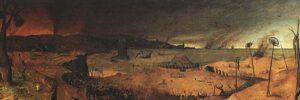Moonstone Presents:

- This event has passed.
Virtual Event: Remembering The Waste Land
December 11, 2022 @ 2:00 pm
Virtual Poetry Event Remembering The Waste Land
Sunday December 11 @ 2PM — VIRTUAL
Registration Required. Register Here:
https://us02web.zoom.us/meeting/register/tZcudeGsqDwiHNGbIKB3XwIbDO4_P-84tFgv
100th Anniversary of The Waste Land

September 26th marked T.S. Eliot’s 134th birthday
Eliot’s groundbreaking poem The Waste Land was published in 1922, 100 years ago
Written in the wake of World War I, a war which turned the battlefield into a waste land, and wasted a generation of combatants and civilians — 20 million dead, 21 million wounded — the poem might be read as a civilian’s post-traumatic stress, or as ecological disaster, or emotional devastation, or spiritual drought.
Eliot’s style in the poem — fragmented, allusive, difficult, obscure…
was startling at the time, so much so that William Carlos Williams considered it a “great catastrophe” for American Poetry; and the notes Eliot appended have led many readers to think of the poem more as an exam than a lyric. Yet even as Eliot’s influence has faded, even as we question his conservatism, his attitudes toward race, his uneasiness with women, his personal demons, The Waste Land continues to signify to our own waste land, and many of us write under its shadow.
Moonstone Invites You
to “come in under the shadow of this red rock” and speak to The Waste Land, or within The Waste Land, or after The Waste Land, or against The Waste Land.
Nathalie Anderson, Host